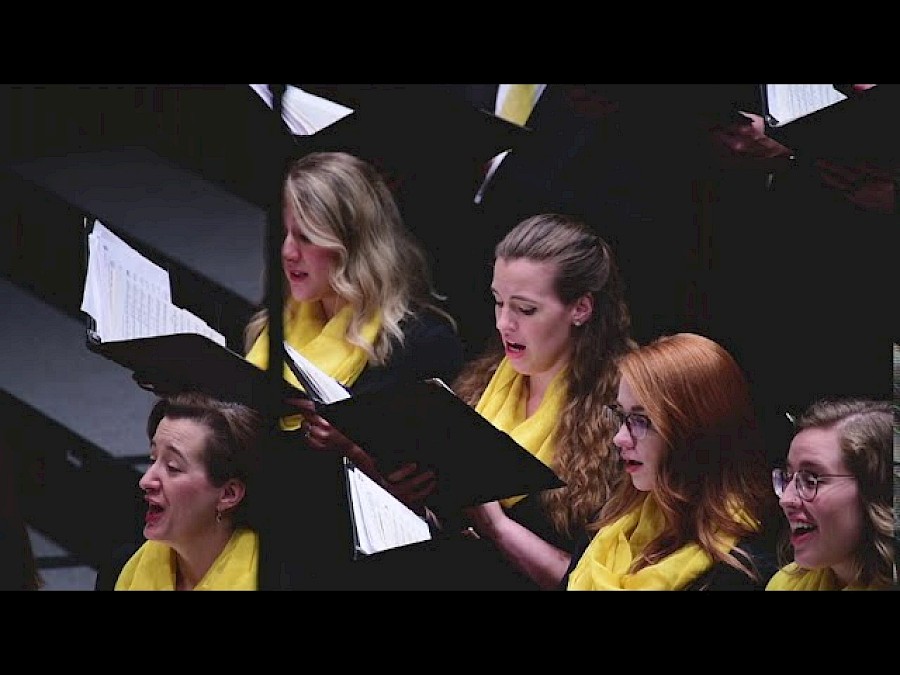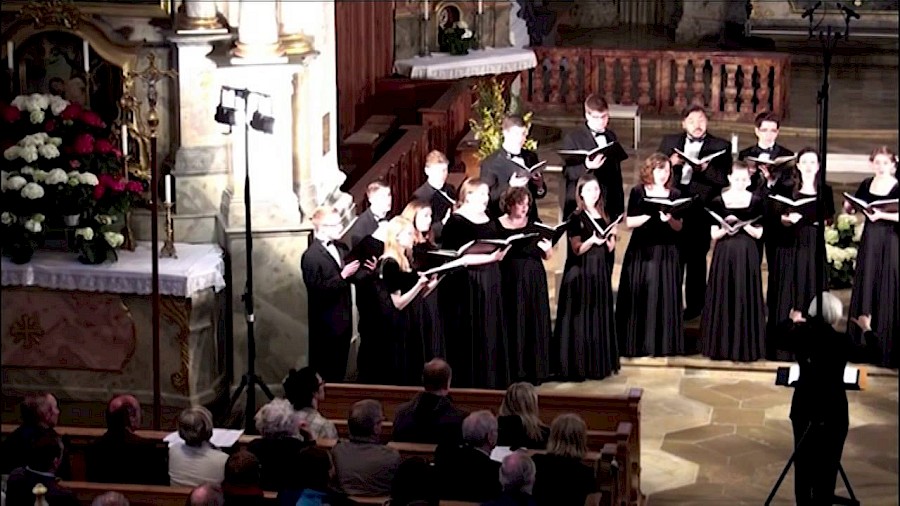Mention Copland to any choral musician, and most will immediately list "The Promise of Living," "Stomp Your Foot," and Old American Songs. In comparison, In the Beginning (1947) is seldom heard. It is notoriously difficult to perform well. It lacks the soaring melodies or foot-tapping rhythms of Copland favorites. Yet many consider it Copland’s choral masterpiece. How do we understand In the Beginning?
Premiered 75 years ago this month, In the Beginning is a 17-minute unaccompanied, single-movement work for chorus and mezzo-soprano soloist. Harvard University commissioned it for a three-day music critics’ symposium attended by luminaries including Virgil Thomson, E. M. Forster, Roger Sessions, and Olin Downes. Rejecting Harvard’s suggestion of a Hebrew text, he chose the creation story from the King James Bible (Genesis 1:1-2:7). In his Copland biography, Howard Pollack suggests a Martha Graham connection to the text, noting that Graham, who performed at the same Harvard symposium, had included passages from Genesis 1 in her earliest scripts for Appalachian Spring.1 Robert Shaw led the Harvard University Collegiate Chorale and soloist Nell Tangeman in the premiere at Harvard on May 2, 1947.
In the Beginning is substantial in length, scope, and content. For seventeen minutes, the performers navigate shifting pitch centers and frequent dissonance - without the support of instruments (though it is sometimes performed with the rehearsal keyboard part Copland supplied). The prominent solo mezzo-soprano part requires an accomplished, trained singer. Listeners, likewise, have a lot to process, even when the performers meet the technical challenges. The sheer quantity of text is huge: no meandering “alleluias” or prolonged “amens.” (Pollack counts “a whopping 38 verses.”) The form is through-composed, meaning that no large sections of music ever return. For seventeen minutes straight, the music, like the text, is always new -- aside from the short, recurring phrase that marks the end of each day. Meanwhile, the Biblical narrative, though familiar, treats a subject no less weighty than the origins of mankind.
Re-listening recently to the work, I was struck by two things. First is what Pollack calls its “monolithic” character. Second was the sonic resemblance to Stravinsky’s mid-century religious choral works like Cantata (1951-52) and Canticum Sacrum (1955), both of which are post-tonal, proto-serial works. “Monolithic,” applied to music, implies something about form, and time, and stasis. To me, it means a lack of traditional, large-scale harmonic development. In the Beginning’s seventeen minutes aren’t structured by the ebb and flow, the tension and release, of common practice tonality. Harmonies and key areas don’t pull the listener forward with underlying dominant harmonies urgently seeking resolution into some kind of tonic. In a monolithic work, pitch and harmony don’t create a strong sonic narrative.
This leads us to words and speech. Before tonality came to dominate Western music, most large-scale musical forms were held together with words. The Mass. Musical plays. Early opera. Later, when tonality’s reign was questioned by early 20th century modernists like Debussy, Stravinsky and Schoenberg, these post-tonal composers often used words to help create large-scale structure, a famous example being Berg’s atonal opera Wozzeck (1923). Copland knew all this music.
Where does In the Beginning belong in Copland’s catalog? It doesn’t fit nicely into the usual Copland categories. It isn’t Americana. It isn’t twelve-tone. It isn’t neoclassic. It isn’t even quintessentially choral. As a pianist, not a vocalist like his contemporary Samuel Barber, Copland knew he was better versed in instrumental idioms. When first offered the commission, he had asked to write an instrumental work instead before he agreed to the choral format. Allison Fromm’s outstanding study of the work concludes that it “encapsulates Copland’s expression of both Jewish and humanist ideals.”2 It makes sense that Copland would see the Harvard commission as an opportunity for a serious statement both musically and philosophically.
So In the Beginning got me thinking about words, narratives, musical form, and time. In the absence of a common-practice harmonic framework, what better way to structure seventeen minutes of music than an ancient narrative from Genesis? A story about the beginning of time, no less? At the start of the Old Testament, God speaks creation into being. The time-word connection is further reinforced in the New Testament gospel of John, which begins, “In the beginning was the Word.” (John 1:1)
Time was indeed on Copland’s mind in the mid 1940s, in part through Graham’s influence during their collaboration on Appalachian Spring. Graham was convinced that myths and truths that transcended time were embodied in her dances.3 In the 1940s, many artists were questioning the traditional Western view of linear time. Copland certainly knew Messiaen’s Quartet for the End of Time (1942), which grappled musically and metaphysically with past-meets-present.
By the end of World War II, Copland’s emphasis on writing Americanist, folk-influenced music was waning as he turned his attention back to international modernism. When In the Beginning premiered in 1947, he was just three years from his first conscious use of a twelve-tone technique (Piano Quartet, 1950). In 1960, Nonet would deliberately merge past and present. Copland’s choral-instrumental work Canticle of Freedom (1955) would also connect post-tonal harmonies with medieval musical influences and a 14th century text.
In this light, In the Beginning could be seen as an early instance of Copland reaching back in time -- to the beginning of time -- to anchor his forward-looking exploration of new harmonic and melodic territory in a period when many composers were re-evaluating their place in history. The work’s words and narrative provide a connecting thread, not only within the work, but between the work and Copland’s larger creative narrative. In the broadest sense, In the Beginning links Copland with human history itself.
Did Copland consider this work an unjustly “neglected child,” like his Short Symphony? Or a not-quite-successful attempt to expand his compositional range, akin to the first version of The Tender Land, which he called “a flop?”4 It would take a fuller study of In the Beginning’s performance and reception history to shed light on these questions.
In closing, I recommend an exceptional performance, by The University of Houston Moores Concert Chorale, recorded live on May 18, 2013 in St. Martin’s Church at the 13th Annual International Chamber Choir Competition in Marktoberdorf, Germany. In a relatively brisk 15 ½-minute performance, the group departs from convention by rotating the solo passages among different choral singers – which results in delightful timbral variety in addition to the work’s other contrasts: legato vs. staccato, effective dynamics shifts both localized and large-scale, and sustained vs. rhythmic passages.
Further reading
- Pollack, Howard. Aaron Copland: The Life and Work of an Uncommon Man. Urbana, IL: University of Illinois Press, 2000, pp. 421-423.
- Fromm, Allison W. “Aaron Copland’s In the Beginning: Context and Creative Process.” DMA diss., University of Illinois, Urbana-Champaign, 2015.
- DeLapp-Birkett, Jennifer. “Appalachian Spring: The Score for Graham’s Ballet.” In Aaron Copland: Appalachian Spring, Original Ballet Version. A-R Editions / MUSA, 2020, pp. xlix-l.
- Copland, Aaron and Vivian Perlis. The Complete Copland. New York: Pendragon Press, 2013, pp. 91, 187-188, 251.
- Conte, David. “A Copland Portrait: Memories of a Friendship, and Thoughts About His Influence on American Choral Music.” The Choral Journal, Vol. 52, No 11 (June & July 2012): 26-29.
- Sieck, Stephen. “Be Fruitful and Multiply: A Theoretical Explanation of Copland's 'In the Beginning.'” Tempo. Vol. 62, No. 245 (July 2008): 47-52.





